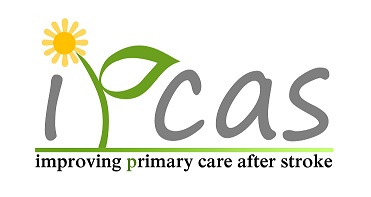Why are we conducting this study?
Initial scoping work of the current system has revealed several flaws in the primary care of stroke survivors. These include;
- A lack of communication between primary care and specialist services.
- Insufficient pathways for referral back to specialist care.
- A lack of access to local services.
- No single point of contact for stroke patients and carers.
“The IPCAS Study is designed to investigate the primary care of stroke survivors and develop an intervention to improve the key problems identified”
No formal primary care based model of care exists to support stroke survivors living in the community. A large variation in the range, quality and access to health services offered to stroke survivors between and within local clinical commissioning groups suggests that many of the stroke survivors’ needs are not being met systematically. The study will explore these problems and aim to develop an improved primary care model.
The development of the model will build on the expectation of the National Stroke Strategy that people who have had a stroke are offered a review from primary care services six weeks and six months after leaving hospital and annually thereafter. Therefore, to address the longer term needs we have developed a multi-factorial primary care model that seeks to enable greater engagement with stroke care and community services, to link effectively to specialist services, and to improve the lives of stroke survivors.
This will be a two-arm cluster randomised controlled trial. Participating general practices will be randomised to deliver either the new model of stroke care or current usual care. The primary endpoint for the trial will be two sub-scales (emotion and handicap) of the Stroke Impact Scale (SIS v3.0) as co-primary outcomes at 12 months (adjusted for baseline). Economic evaluation as well as quantitative and qualitative assessments of intervention fidelity will also be performed.
The IPCAS study has three main aims.
- To develop a primary care based model to optimise post-discharge care for stroke survivors.
- To develop a “My Life After Stroke” (MLAS) programme for people with stroke and their carers.
- To evaluate the clinical and long term effectiveness as well as cost of these interventions.
Whilst working in collaboration with individuals from several institutions a new model of care will be developed using the findings from several pieces of research:
- A review of current evidence for the care of stroke survivors.
- A series of qualitative studies involving health care professionals, stroke survivors and their carers.
- A consensus study to look at the re-referral of stroke survivors back to secondary care.
“This programme aims to develop a primary care model to optimise post-discharge care for stroke survivors”
The feasibility, acceptability and fidelity of this model will then be assessed using two pilot studies,
- the IPCAS Pilot
- the MLAS Pilot
Collaborators
Throughout our research we will be collaborating with individuals from many different institutions. Some of these are listed below.
London School of Hygiene and Tropical Medicine
![]()

